Exploring Home Birds: Characteristics and Care Guide
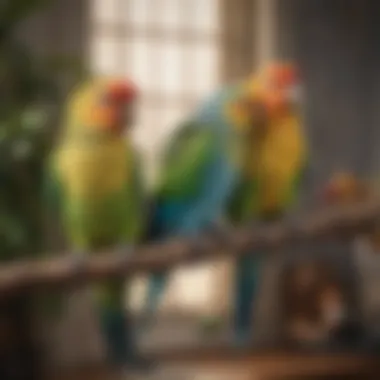
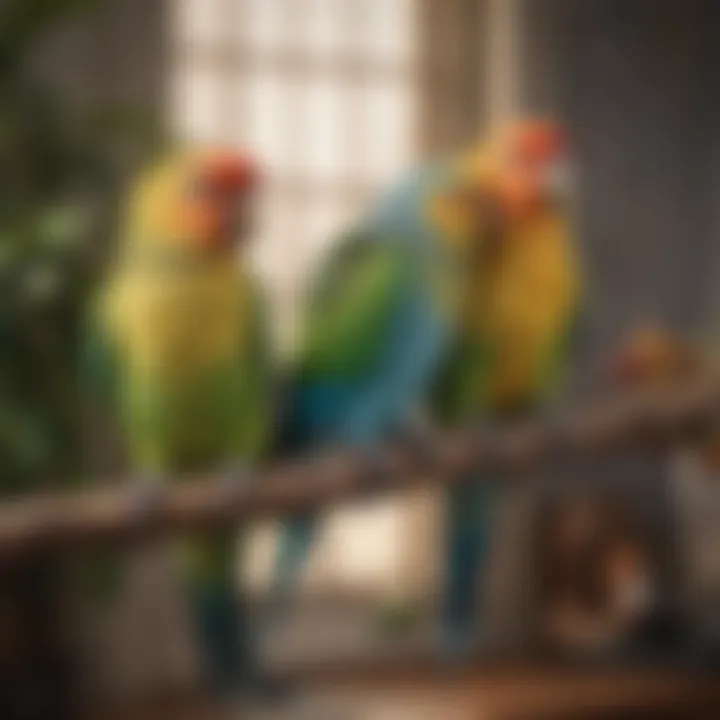
Intro
In the comforting embrace of our homes, where cushions soften the edges of our lives and coffee brews warmth into our mornings, there exists an unlikely yet captivating presence: home birds. These feathered companions are more than mere pets; they add color, song, and a unique vibrancy to our daily existence. Whether it’s the cheerful chirp of a canary or the playful antics of a parakeet, discovering the world of avian companionship is both enlightening and rewarding.
Many people might contemplate the idea of welcoming a bird into their home but hesitate due to uncertainty about their care and behavior needs. This article endeavors to illuminate the wonderful aspects of having birds as companions, covering everything from understanding their unique personalities to ensuring they thrive within our domestic worlds.
A journey into bird ownership reveals not only their charming characteristics but also the responsibilities that come along with them. Tuning into their needs, habits, and emotions creates a bond that can change both human and avian lives profoundly. Let’s unravel what it truly means to embrace these captivating creatures into our lives.
Understanding Your Pet
Pet Behavior Basics
Birds present a fascinating spectrum of behavior that can sometimes puzzle even seasoned pet owners. It’s crucial to recognize that, unlike more traditional pets, birds often display behaviors that are deeply influenced by their evolutionary background as winged animals. For instance, many species enjoy social interactions, mimicking sounds, and engaging in playful activities. Understanding that birds have a social hierarchy and develop strong bonds with their peers, both human and avian, is foundational to nurturing a healthy relationship.
Common Breed Characteristics
When it comes to birds, it’s not one size fits all. Varied species boast differing temperaments and needs:
- Budgerigar (Budgie): These little ones are bubbly and sociable, often mimicking speech and sounds. They thrive in groups and enjoy human interaction.
- Cockatiel: Known for their affectionate nature, they can be quite vocal and enjoy spending time with their owners. They are prone to forming strong bonds.
- African Grey Parrot: Highly intelligent and social, they require mental stimulation and companionship to thrive. Their need for engagement cannot be overstated.
Understanding the unique characteristics of each breed is vital in ensuring you set up an environment that aligns with their instincts.
Species-Specific Needs
Diving deeper into the care of your feathered friend necessitates an awareness of their specific requirements. Species such as finches flourish in large, open aviaries, whereas smaller conures may feel comfortable in more compact cages. Each species also has unique dietary needs, which can vary from seeds and pellets to fruits and vegetables. Addressing these specific needs not only enriches their lives but also fosters a sense of security within their homes.
"Birds are not just pets; they are dynamic beings that thrive on companionship and care. Understanding them is key to friendship."
Pet Care and Maintenance
Feeding Guidelines
Nutrition plays a pivotal role in maintaining the health and happiness of birds. A well-balanced diet adapted to your bird's species is fundamental. Seeds may be a common staple, but they often don’t offer the complete nutritional profile birds need. Fresh fruits, vegetables, and specialized pellets should be part of their daily menus. Always consult resources or avian veterinarians to customize feeding plans that meet your pet's exact needs.
Grooming Essentials
Regular grooming isn’t just about keeping your bird looking sharp; it’s integral to their health as well. Birds use their beaks to preen and care for their feathers. Providing a shallow dish for bathing enhances their comfort. Additionally, keeping their nails trimmed and ensuring proper beak care is crucial—both can affect their ability to eat and move around comfortably.
Hygiene Practices
Creating a clean living space is non-negotiable. Regularly change bedding, clean food and water dishes, and offer safe toys to keep the environment healthy and stimulating. An unkempt space can lead to health issues, so routine cleaning is essential to ensure the longevity and well-being of your avian companions.
Training and Development
Basic Commands and Skills
Have you ever seen a bird perform tricks? It’s no easy feat, but with patience and consistent training, many species can learn basic commands. Start with simple cues like "come" or "step up"—these are effective in fostering a bond and promoting safety.
Behavioral Training Techniques
Utilizing positive reinforcement is an effective training method. Rewarding good behavior with treats or applause encourages birds to engage in desired actions. Timing is vital; rewards should follow immediately after the behavior to help them make connections. The signals provided during training can also serve as a bridge to better communication with your bird.
Addressing Common Behavior Issues
Birds can exhibit behaviors that may seem bothersome, such as excessive screeching or feather plucking. Identifying the root cause—whether it’s environmental stress, lack of interaction, or boredom—can guide you in addressing these issues. Providing adequate stimulation, companionship, and even consulting an avian behaviorist might be necessary to resolve deeper problems.
Health and Wellness
Routine Vet Check-ups
Just like any other pet, yearly vet visits are paramount. Avian veterinarians can detect underlying health problems that might not be immediately obvious. Those check-ups allow you to stay ahead of potential issues and ensure your bird remains fit as a fiddle.
Vaccination Needs
Certain species require vaccines, much like you’d have for other pets. It’s essential to have an informed discussion with your vet regarding what’s pertinent for your specific bird breed.
Recognizing Signs of Illness
Being observant can save your pet’s life. Watch for changes in behavior, appetite, or feather condition. Signs like lethargy, puffing up, or not engaging can be signals of trouble. Early detection can lead to better outcomes.
Enrichment and Activities
Indoor vs. Outdoor Activities
While many birds thrive indoors, they still require variety in their routine. Indoor playtimes should be frequent, allowing your bird to stretch its wings and exercise. If the environment permits, supervised outdoor time can introduce them to new sights and sounds, beneficial for their mental stimulation.
Interactive Toys and Games
Birds are intelligent creatures that grow restless without stimulation. Invest in several toys that encourage problem-solving, like foraging toys. Rotate them regularly to maintain interest and engagement, thus lowering the likelihood of destructive behaviors.
Socialization Opportunities
Birds flourish in company. Whether it's integrating another bird into the household or hiring a pet sitter when you’re away, socialization is fundamental. Engaging with your bird daily helps not only in training but also in creating lasting bonds of affection.
Unraveling the world of home birds lays the groundwork for a fulfilling companionship. With proper understanding, care, and commitment, the experience can profoundly enrich the lives of both pets and their human partners.


Foreword to Home Birds
Keeping birds as pets is a topic that brings together enthusiasts, families, and animal lovers alike. Birds are not just companions; they bring an entirely new perspective to home life. This section aims to lay the groundwork for understanding their importance while preparing potential and current bird owners for what lies ahead.
Understanding Avian Companions
Birds can often get overlooked when we talk about household pets, but they have a personality that's both unique and engaging. From the charming chirps of budgerigars to the expressive behaviors of cockatoos, these avian companions can form bonds similar to those we see with dogs or cats. Each species has its distinct quirks and preferences, akin to different dialects within a language. Developing an understanding of your bird not only enhances your relationship but also enriches their lives.
Birds often have two sides to their personalities. On one hand, you have the playful and curious side; this is where they might explore their environment or engage in social play. On the other hand, stress can manifest in behaviors such as feather plucking or excessive vocalization. A close observation can help catch these signs early, ensuring the bird remains healthy both physically and emotionally. With patience and care, the bond between a bird and its owner can deepen, leading to a rewarding companionship.
The Appeal of Keeping Birds at Home
There are several reasons why people choose to welcome birds into their homes. For one, many pet birds are surprisingly low maintenance compared to other pets. They don’t require walks, and the vast majority can be housed in cages that fit well in limited spaces. This makes them particularly appealing for those living in apartments or smaller homes.
Additionally, birds are social creatures. Keeping them often provides dual benefits: they are entertaining to watch and can also become affectionate companions. Imagine a bright parrot keeping you company while you read or study—it can bring a splash of color to even the dullest days. Furthermore, forming a strong bond with your feathered friend can boost your mood and alleviate feelings of loneliness.
"Birds may fly away, but the bonds they form can make your heart feel full."
There is also the fascinating aspect of training. Educating your bird in basic commands or tricks can be one of the most rewarding experiences. Birds can learn faster than many might think, turning simple interactions into beautiful exchanges of communication. So, as you consider welcoming these feathered companions into your life, recognize their potential to enhance not just your home but also your emotional world.
Species of Home Birds
Understanding the variety of home bird species is paramount for anyone looking to welcome a feathered companion into their lives. Each species comes with its own set of needs and characteristics that not only influence their care but also impact the bond between the bird and the owner. Knowledge of species diversity allows potential owners to make informed decisions, ensuring that they choose a bird that aligns with their lifestyle.
Popular Pet Bird Species
When it comes to pet birds, certain species tend to fall into the limelight due to their affectionate nature and adaptability to the home environment. Among these, budgerigars—often called budgies—are wildly celebrated for their vibrant colors and sociable demeanor. These small parakeets often become lively members of the household, chirping away and sometimes even picking up words.
Cockatiels, another popular choice, charm with their playful antics and friendly personality. Their ability to whistle songs or mimic sounds can make them quite the entertainer.
Some individuals gravitate toward the larger Macaws or African Grey Parrots. While they require more space and attention, their intelligence is unparalleled, allowing for deep and engaging interactions. However, before choosing any bird, consider it’s more than just an accessory; you’re inviting a living creature with emotions and intelligence into your home.
Suitable Birds for Small Spaces
Many prospective bird owners live in apartments or homes with limited space. Thankfully, several bird species thrive in small environments. Finches are excellent candidates. They are calm, small, and can coexist happily in smaller cages, often bringing joy in their charming social interactions.
Canaries are also a top choice. Their beautiful songs fill the space with music, and they don't require as much out-of-cage time as larger birds, making them highly manageable.
Opting for Lovebirds can also be a wonderful idea, as they bring warmth and companionship. They are compact but full of energy, and their social nature means they often bond with their human companions or with each other, thus, keeping them entertained.
Understanding Different Bird Personalities
Birds, much like people, have their own personalities that can greatly affect how they interact with their owners and environment. For example, while Budgies are generally laid-back and can adapt easily to different settings, Cockatoos are known for their intelligence and sometimes demanding behavior.
Observing a bird's behavior can help in forming a stronger bond. A shy bird may take time to warm up, while a curious bird might readily explore its surroundings.
It's vital to recognize these differences. Owners can create tailored experiences that cater to the unique character of their feathered friends. Understanding these myriad personalities leads to better care and a more satisfying companionship.
"Choosing a bird is much like choosing a partner; their personality must complement yours to nurture a harmonious relationship."
Overall, knowing about different bird species, their suitability for living situations, and their personalities lays the groundwork for a successful pet-owner relationship. As the journey progresses, the joy of having a pet bird can be truly rewarding.
Setting Up a Habitat
Creating a suitable habitat for your bird is pivotal for their well-being and happiness. A comfortable and enriching environment can enhance their health and promote emotional security. Let's dig deeper into the essential components needed for establishing a rightful sanctuary for your feathery companion.
Choosing the Right Cage
Selecting the right cage is perhaps the first step toward fostering a healthy living space for your bird. The size, shape, and material of the cage all play a significant role in your bird's comfort. As a general rule of thumb, larger cages are better, allowing your bird to spread its wings and move around freely.
- Dimensions Matter: A common mistake among new bird owners is overlooking the dimensions of the cage. Small cages can lead to stress and health issues, so measure out ample space. As an example, a cockatiel usually thrives in a cage that's at least 24 inches wide and 24 inches deep.
- Shape Considerations: Opt for a rectangular or square cage when possible as these shapes promote better flight and movement compared to round ones.
- Material Choices: Stainless steel cages are often preferred due to their durability and easy cleaning. Ensure there's no lead or zinc in any painted surfaces, as these can be fatal to birds.
Selecting the right cage may require a bit of time and thought, but it's essential for ensuring your companion feels safe and secure.
Creating a Comfortable Environment
A comfortable environment extends beyond just choosing a cage. It incorporates various factors that contribute to your bird's overall happiness.
- Positioning the Cage: Place the cage in an area of your home where your bird can observe daily activities but isn't exposed to direct drafts or extreme temperatures. This not only provides a sense of safety but also engages your bird with the family dynamics.
- Temperature and Humidity: Most birds prefer a mild climate, so keeping the room temperature stable is essential. Aim for about 70°F to 80°F when possible, while also maintaining appropriate humidity levels. A humidifier may be useful, especially in dry climates.
- Light Exposure: Birds need natural light to stimulate their circadian rhythms, so placing their cage near a window is beneficial. However, avoid direct sunlight for prolonged periods, which can cause overheating.
By tuning these specifics, you set the stage for a cozy and safe habitat that lets your bird live comfortably.
Essentials for Bird Enrichment
Birds are intelligent creatures that thrive on stimulation and engagement. Without mental and physical enrichment, they may become bored or exhibit undesirable behaviors. Here’s how you can enrich their habitat:
- Toys and Activities: Invest in various toys made from safe materials that encourage chewing, climbing, and playing. Rotate these toys regularly to keep things fresh and interesting.
- Perches of Different Sizes: Install perches of varying widths and textures. This helps with foot health and provides different surfaces for your birds to explore.
- Foraging Opportunities: Mimic natural foraging behavior by hiding treats in their cage or providing foraging toys. This encourages them to work for their food, which keeps them mentally stimulated.
- Social Interaction: Birds are social beings and need interaction not only with their human caretakers but potentially with other birds too. If you have the means, consider getting a compatible second bird as a companion.
By incorporating these enrichment essentials, your bird’s habitat becomes an arena for exploration and play, making their life much more fulfilling.
"Creating a suitable habitat is like laying a strong foundation; it supports a thriving ecosystem for your feathered friend."
Setting up an optimal habitat for your bird goes beyond just aesthetics. Each factor—the choice of cage, comfort in the environment, and enriching activities—holds critical importance in ensuring your avian pet enjoys a long, happy, and fulfilling life.
Nutrition and Feeding
Nutrition and feeding play vital roles in the health and wellbeing of pet birds. Owners must understand that a well-balanced diet is not just a routine; it’s the cornerstone of their avian friend’s life. A bird’s diet affects not only its physical health but also its behavior, mood, and even lifespan. When birds receive proper nutrition, the benefits are plenty, from vibrant feathers and energy levels to improved immune responses. Conversely, a poor diet can lead to various health issues, making it essential to prioritize nutritional knowledge.
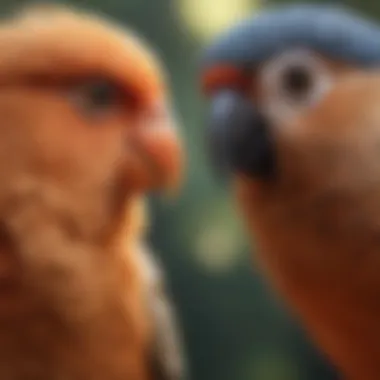
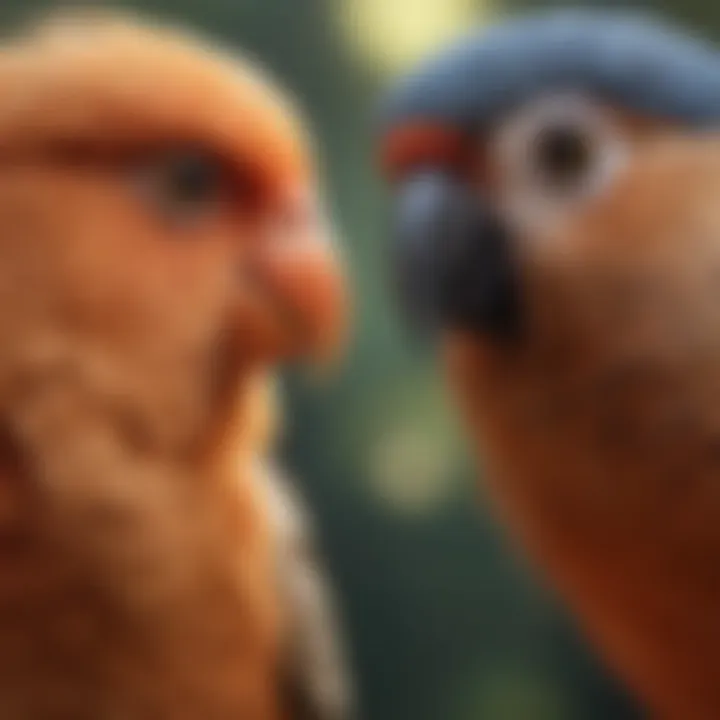
Balanced Diet for Pet Birds
Creating a balanced diet for pet birds can be akin to preparing a good meal for a friend. A mix of high-quality pellets, fresh fruits, vegetables, and some seeds often does the trick. Pellets should form the base of their diet, as they are nutritionally complete and prevent picky eating habits common with seed diets. For example, foods like carrots, spinach, and bell peppers provide essential vitamins and minerals. Fruits such as apples (without seeds), bananas, and berries also make tasty treats.
When planning meals, consider these categories:
- Grains: Oats, quinoa, and whole grain bread (in moderation).
- Veggies: Kale, broccoli, sweet potatoes, or peas—variety is key.
- Fruits: Citrus fruits, papaya, or melon can be nutritious snacks.
- Proteins: Small amounts of scrambled eggs or cooked fish can augment their diet.
A colorful plate leads to a colorful bird. Brightly colored fruits and veggies can entice your finch or parakeet to try new things and stay healthy.
Common Mistakes in Bird Feeding
Many first-time bird owners fall into common pitfalls when it comes to feeding. One significant mistake is relying solely on seeds. While seeds can be appealing, they are often low in essential nutrients and high in fat, which can lead to obesity and health problems. Additionally, some owners may underestimate the importance of food variety. Feeding a bird the same thing day in and day out can lead to dietary deficiencies.
Here are some common feeding faux pas:
- Ignoring fresh food: Fresh produce is crucial for vitamins that processed foods often lack.
- Overindulging on treats: Just like humans, birds can have too much of a good thing, especially in the sugary form of fruits.
- Free-feeding: Leaving food out all day can lead to overeating and spoilage, rather than establishing a consistent feeding schedule.
- Neglecting hydration: Water quality and availability are just as critical as food—always ensure clean drinking water is accessible.
Understanding Supplement Needs
Supplements can be a beneficial addition for birds if the diet alone doesn’t hit all the right notes. However, supplements should be used judiciously. For instance, calcium is crucial for birds, especially breeding females and elderly birds who may need extra support. Calcium deficiencies can lead to serious health issues, such as weakened bones or reproductive problems.
Additionally, probiotics can aid in digestive health, particularly after a period of dietary change or illness. Other common supplements include vitamins and amino acids, but it’s essential to consult with a veterinarian to tailor any additional needs specific to your bird. Beware of over-supplementation, as it can be just as harmful as deficiencies.
In summary, a balanced diet, awareness of common feeding mistakes, and understanding any supplement needs make for healthier, happier birds. These aspects combined enhance the overall quality of avian companionship, facilitating a bond based not only on affection but on mutual well-being.
Behavioral Understanding
Understanding bird behavior is crucial for anyone considering avian companionship. Birds, like any other pets, express their feelings, preferences, and needs in various ways. Learning to interpret these behaviors can greatly enhance the bond between the bird and its owner. From chirps to wing flaps, each action can relay specific messages. Recognizing these signs ensures that pet owners can respond appropriately, fostering a happier and healthier environment for their feathered friends.
Observing a bird's behavior also offers insights into its emotional and physical well-being. A happy bird typically exhibits energetic behavior, singing, and playing. In contrast, abnormal actions can indicate stress or illness, which can impede not only the bird's happiness but also its overall health. Therefore, mastering behavioral understanding is not just a nice skill to have; it's essential for anyone wanting to invest in a long-term relationship with their avian companion.
Interpreting Bird Behavior
Birds communicate through a fascinating array of vocalizations and body language. For instance, a rapidly flapping wing can either mean an expression of joy or a signal of anxiety depending on the context. Likewise, head bobbing often shows excitement or curiosity, while fluffing up feathers can indicate the bird is cold or submissive. Whether you have a parakeet or a cockatoo, each species possesses distinct behavioral traits that tell a story of their mood and environment.
Here are some commonly observed behaviors:
- Chirping and Whistling: Indicate happiness or the desire for interaction.
- Preening: A bird's way of taking care of its feathers, essential for their well-being.
- Biting: Can be a warning sign; it often suggests that a bird feels threatened or overwhelmed.
Being attentive to these nuances allows owners to create better living conditions that support their pet’s needs and preferences.
Common Behavioral Issues
While many behaviors can reflect a bird's emotional state positively, undesired behaviors sometimes arise too. It's important to be aware of these challenges to address them effectively.
Some common behavioral problems include:
- Excessive Screaming: Often a sign that the bird seeks attention or is lonely. Addressing this can require more interaction or socialization.
- Feather Plucking: This compulsive behavior can result from stress, boredom, or lack of stimulation. It's crucial to evaluate the living environment and interaction levels.
- Aggression: Sometimes, a bird might act territorial, which can stem from fear or protection instincts. Training and patience are key to handling such situations.
Being proactive about these issues helps maintain a peaceful atmosphere in the home as well as ensuring that the bird thrives emotionally and physically.
Enhancing Social Interactions
Birds are inherently social creatures. Creating opportunities for your pet to engage with both you and other birds is vital for their emotional health. Playtime and interaction not only alleviate boredom but also help establish trust and companionship.
Here are some effective ways to increase social interactions:
- Daily Interaction: Spend quality time with your bird, whether it’s talking, playing, or simply being nearby. This closeness can reinforce the bond.
- Training Sessions: Teaching your bird tricks or commands can be enlightening and mentally stimulating for both you and your feathered friend. This is an excellent approach to channel their energy positively.
- Introducing New Sounds and Toys: Mixing up their environment keeps things fresh. Rotate toys regularly and introduce new sounds to keep their curiosity piqued.
Avian companionship comes with responsibilities, but the reward of a lively, engaging bird brings immeasurable joy to family life.
Health and Wellness
When it comes to keeping home birds, the topic of health and wellness cannot be underestimated. Just like any other pet, birds require a comprehensive approach to their overall well-being. Healthy birds not only display vibrant plumage and lively behavior, but they also forge stronger bonds with their owners. By prioritizing their health, bird owners can enhance their pets’ quality of life and reduce potential health complications down the line. Here, we’ll break down essential areas of bird health including routine checks, disease prevention, and spotting signs of illness.
Regular Health Checks
Regular check-ups form the backbone of a bird's health regimen. These aren't just for when something appears to be off; regular health assessments help catch issues before they escalate. As pet owners, it's important to get familiar with a bird’s normal behaviors and appearances.
- Observe Changes: Keep an eye on your bird's eating habits, feather condition, and energy level. A sudden drop in activity or changes in food intake may indicate underlying problems.
- Schedule Vet Visits: A veterinarian experienced with birds should be consulted at least once a year. This helps establish a baseline for health, making it easier to spot any future issues.
- Weight Monitoring: Keeping track of weight is crucial. A scale can be useful for monitoring short-term weight changes, which can often reveal health issues hidden beneath the feathers.
Regular health checks can help catch potential problems early, ensuring a longer, happier life for your avian companion.
Preventing Common Diseases
Preventative care is essential in the realm of avian health. Birds can be prone to various diseases that stem from inadequate care or environmental factors. Here are some proactive measures to consider:
- Clean Environment: Ensure that the bird’s living space is clean. Fresh bedding, clean food and water, and regular cage cleaning can prevent the spread of bacteria.
- Dietary Considerations: A poor diet can lead to many health issues, including obesity and malnutrition. Providing a varied diet rich in fresh fruits, vegetables, and appropriate seeds can keep health issues at bay.
- Vaccinations: Just like dogs and cats, some birds can benefit from vaccinations. Check with avian vets about what vaccinations may be suitable for your bird species.
Signs of Illness in Birds
Birds are often masters at hiding their discomfort. Observing their behavior is key to spotting any signs of illness, and being proactive can save a lot of heartache:
- Changes in Vocalization: A bird that stops chirping or suddenly becomes more vocal may be trying to communicate discomfort.
- Fluffed Feathers: If your bird is fluffed up and sitting at the bottom of the cage, it could indicate it’s unwell. Healthy birds tend to be alert and display sleek feathers.
- Loss of Appetite: A sudden reduction in food intake can be a clear indicator that something is off.
- Abnormal Droppings: Changes such as diarrhea or unusually colored droppings should raise immediate concerns. These can signal various health issues.
- Behavioral Changes: Certain changes, like excessive sleeping or aggression, may indicate underlying problems in one’s feathered friend.
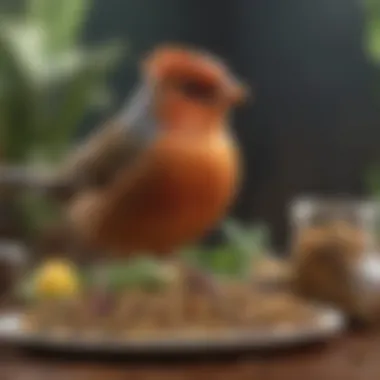
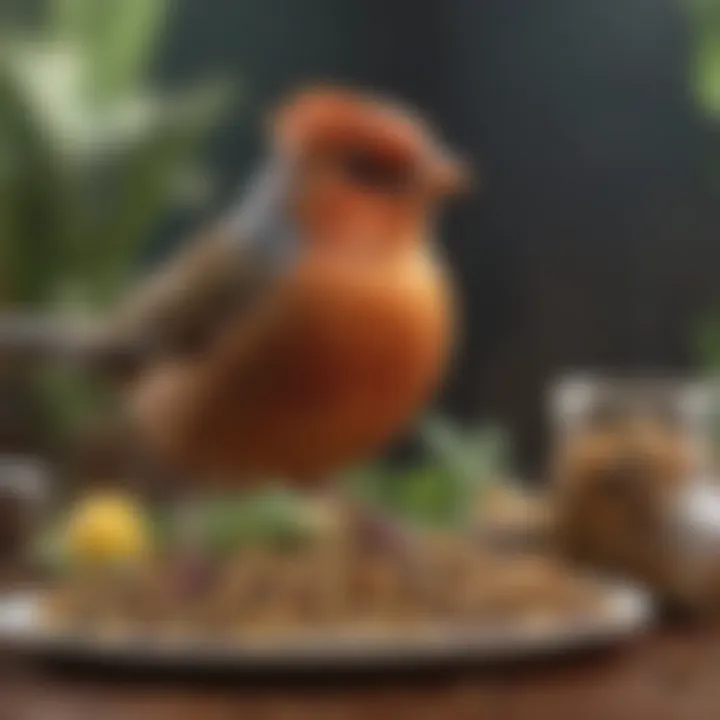
By harnessing a conscious approach towards health and wellness, bird owners can pave the way for a happier and healthier pet experience. Keeping an eye on regular health checks, preventing diseases, and recognizing the signs of illness is essential to ensure that your avian companion thrives in its home environment.
Social Aspects of Bird Ownership
The journey of owning birds extends beyond the simple act of providing food and a cage. One must delve into the intricate social tapestry that forms when one brings these feathered companions into their homes. Birds, despite their petite size, possess rich personalities and unique social needs that can significantly impact the bond between pet and owner. Understanding these social dynamics not only enriches the life of the bird but also enhances the overall experience for the owner, fostering a sense of fulfillment and joy in the relationship.
Building Trust with Your Bird
Building trust is one of the cornerstones of a successful relationship with your bird. Just like humans, birds require time to feel secure in their environments. Patience becomes your best ally in this endeavor. Initially, your feathered friend may be wary, retreating at sudden movements or loud noises.
To nurture trust, consider these steps:
- Consistent Interaction: Spend time talking softly to your bird, allowing it to become accustomed to your presence. Over time, it should recognize your voice as a source of comfort.
- Gentle Approach: Begin by offering treats from your hand, encouraging your bird to associate you with positive experiences.
- Respecting Boundaries: Each bird has its comfort zone. If your bird avoids physical contact, don’t rush it. Allow it to approach you at its own pace.
"Trust isn't given; it's earned. Be the heart your bird flutters towards."
Birds as Social Creatures
Birds are inherently social beings. In the wild, they thrive in flocks, engaging in complex interactions that are essential for their well-being. When viewed in a home environment, this aspect of their nature becomes critical.
Recognizing that your bird has social needs similar to those of other pets can transform how you approach its care. Consider this:
- Birds often engage in vocalizations to communicate, not just with fellow birds but with their human companions as well. Mimicking sounds can be a fun conduit for bonding.
- Having a companion bird can alleviate loneliness for single pet birds; however, this introduces new dynamics and requires careful consideration of species compatibility.
- Regular playdates or simply spending time together can fulfill your bird's social cravings. Use toys that encourage interaction, helping your bird to develop its social skills.
Engaging with Other Bird Owners
Creating a community among fellow bird enthusiasts can bring a wealth of knowledge and support. Engaging with others who share your passion fosters learning and can lead to lifelong friendships.
Where can you connect with other bird owners?
- Online Forums: Platforms like Reddit host vibrant discussions where you can share experiences and seek tips on everything from diet to behavioral issues.
- Social Media Groups: Join Facebook groups dedicated to pet birds. Such groups often post valuable resources like care guides, shared anecdotes, and even local meetups.
- Local Bird Shows and Rescues: Attending these events allows for face-to-face connections with other bird lovers while exploring diverse species and understanding their specific care needs.
Building a network around your bird ownership journey not only enriches your learning but also enhances your experience overall. Remember, in this vast aviary of life, you're never alone.
Addressing Common Challenges
Keeping birds as pets comes with its own set of challenges. Understanding how to tackle these issues not only improves your experience but also ensures the well-being of your feathery friends. Many new bird owners dive in without fully grasping the complexities of avian care, and this can lead to frustration for both the owner and the bird. Thus, it’s essential to focus on three primary challenges: noise, mess, and setting realistic expectations. Navigating these areas effectively can enhance the companionship experience.
Overcoming Noise Concerns
Birds are known to be vocal creatures, each species bringing its own unique melody to your home. However, some sounds can become bothersome, especially in quieter households. Parrots, for example, can be particularly loud during specific times of day or when they seek attention.
- Understanding Vocalization: First off, recognize that vocalizing is part of a bird's natural behavior. It's their way of communicating, and often reflects their mood. Become familiar with their sounds—each chirp might signify different emotions like happiness or boredom.
- Choosing the Right Species: If noise is a significant concern, do your homework before choosing a bird. Budgerigars or finches might be less vocal compared to larger parrots, making them more suitable for quieter environments.
- Noise Management Strategies: Try this—set designated happy hours for their vocal antics when you’re available to engage with them. Also, invest in some quality toys that can stimulate them mentally, potentially diverting their attention from excessive calling.
“Managing your bird’s environment thoughtfully can help you strike a balance between their natural behavior and your quiet needs.”
Dealing with Messiness
Birds can be messy creatures; they scatter seeds, feathers, and droppings, turning your living spaces into a bit of a feathered cyclone. However, this doesn’t mean you should avoid birds altogether. Instead, understand the mess and plan accordingly.
- Setting up for Success: Designate a specific area for your bird. You could use an easily cleanable surface or disposable covers to make cleanup a breeze. When they are out of their cage, a bird-friendly mat can catch droppings and seeds.
- Regular Cleaning Routine: Create a cleaning schedule. Wipe surfaces regularly, and use safe disinfectants that are pet-friendly. A quick daily sweep can keep things tidy and make weekly cleaning sessions less daunting.
- Behavioral Training: Teaching your bird that there are ideal spots for eating and playing can also minimize mess. Simple commands and positive reinforcement can encourage them to stay in designated areas, making life a tad easier.
Managing Expectations with First-time Birds
When you first welcome a bird into your home, it’s easy to fantasize about a perfect companionship filled with chirpy conversations and cuddly moments. However, reality can be a tad different, especially when you consider the amount of time and patience required.
- Patience is Key: Birds are not like traditional pets that warm up instantly. They need time to acclimate to their new environment and bond with you. Expect some initial wariness, because for them, change can be overwhelming.
- Commitment to Care: Understand that birds often require daily interaction and mental stimulation. They are social creatures that thrive on companionship, so isolating them can lead to behavioral issues down the road. Be prepared to invest time into training and bonding exercises.
- Realistic Goals: Start with small, achievable goals. Perhaps aim for a few minutes of interaction each day and gradually increase. Track progress rather than having unrealistic benchmarks, which can lead to disappointment.
Bird companionship can be incredibly rewarding, but knowing how to approach the challenges is vital. Addressing noise, mess, and expectations thoroughly sets the foundation for a meaningful and lasting relationship with your avian companion.
End: The Rewards of Keeping Home Birds
Keeping home birds offers a unique blend of joy, companionship, and a dash of responsibility. Those who choose to invite these feathered companions into their lives often find themselves on a remarkable journey rich with rewards. Not only do they provide delightful chirping melodies that fill the home, but the emotional bonds formed between humans and birds can be particularly profound.
One of the main highlights of owning birds is the way they thrive on attention and interaction. Birds such as African Grey Parrots or cockatiels show distinct personalities that can make them engaging companions. People often find themselves deeply attached, developing a relationship that’s rewarding in its emotional layers.
Moreover, keeping birds can increase awareness of one's environment. Birds are sensitive to changes in their habitat, prompting owners to create a nurturing space that benefits both the pet and their caretakers. There's a sense of fulfillment that accompanies the act of providing for another being, fostering a sense of responsibility. As pet owners reflect on their relationship with their birds, they can appreciate the subtle nuances that come with it.
In addition to companionship, many bird owners report improvements in their moods and mental well-being. The simple act of watching a bird play or interact brings a sense of peace and joy, breaking up the daily grind.
Ultimately, as with any pet, keeping birds is not without its challenges. Owners must commit to understanding their needs, from proper dietary requirements to social interactions. But the benefits often outweigh these concerns, creating a long-lasting bond that enriches both the human and avian experiences.
"The true joy of keeping birds lies not just in their presence, but in the moments of connection that transcend species."
Reflecting on the Companion Journey
In the course of nurturing a bird, owners embark on a journey that profoundly shapes their perspective on pet ownership. Unlike conventional pets, birds often require special attention and care, which can foster a strong sense of companionship. It’s crucial to understand that each bird is a unique individual, with emotions and needs that can mirror those of humans.
During this journey, pet owners might come face to face with the realities of avian life, such as their social needs and dietary restrictions. For example, many birds enjoy interaction with their caretakers and can become agitated if ignored. A strong commitment to understanding and meeting these needs turns simple ownership into a companionship characterized by mutual respect and affection.
As individuals reflect on these experiences, it often becomes clear that the bond between birds and humans is a two-way street. Many bird owners find that their pets respond to their moods, offering comfort in times of stress or companionship during loneliness. These relationships can shed light on the importance of emotional connectivity across species.
Embracing the Challenges and Joys
Owning a bird comes with the understanding that challenges are part and parcel of the experience. The high-pitched chirps that delight some may also frustrate others, especially in quiet households. Much like any relationship, it’s essential to embrace both the challenges and joys that come with bird ownership.
Here are some considerations:
- Noise Levels: While birds can be quite chatty, this can add to the vibrancy of home life. However, not all can tolerate a loud environment, and finding a bird that fits one’s lifestyle is crucial.
- Messiness: Birds can be messy eaters, scattering seeds and droppings. Regular cleaning routines can mitigate these inconveniences, allowing one to focus on enjoying their company.
- Time Commitment: Birds thrive on social interaction; hence, spending quality time is essential. Balancing one’s schedule to ensure the bird feels loved and cared for is a must.
Yet, these challenges often morph into cherished memories. Every instance of a bird learning a new trick or engaging in playful antics serves to endear the pet even further. The laughter and joy derived from such moments create a treasure trove of experiences that far outweigh the initial troubles.
In essence, the rewards of keeping home birds are deeply intertwined with the challenges faced. The satisfaction derived from nurturing these creatures enables bird owners to understand and appreciate life's delicate intricacies. Each chirp, each flutter, and each moment spent together contributes to a rich, shared existence.







